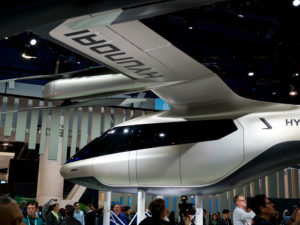In the modern age, people are ready to get excited about flying car industry stocks. Excitement continues to build around flying car stocks following recent positive news in the sector.
California startup Alef Auto got FAA certification to test its Model A vehicle. That vehicle could become the first vehicle that can both fly and drive on U.S. roads with initial deliveries expected in late 2025.
The news has renewed investor interest in all things related to flying car industry stocks. That is especially promising for all publicly traded companies involved in vertical takeoff and landing aircraft, which operate in a similar space.
Their vehicles, too, will transport people, deliver packages, and evacuate patients, among other functions. That makes the following flying car industry stocks worth watching and potentially investing in.
Joby Aviation (JOBY)

Joby Aviation (NYSE:JOBY) is worth investing in because it is among the pure-play flying car industry stocks. The electric VTOL firm has very strong government backing.
The company noted its strong backing across the Advanced Air Mobility (AAM) industry throughout government in its first quarter earnings report. I
n fact, Joby Aviation will move two of its aircraft to Edwards Air Force Base in 2024 as part of a contract with the U.S. Air Force(2). Joby Aviation should to deliver its first eVTOL to a customer during the same year.
That said, Joby Aviation, like many startups, continues to lose money. The firm won’t release second-quarter earnings until August 2.
However, Q1 results showed a $113 million net loss. At that time, the firm boasted $978 million in liquidity so it is clearly not a going concern.
Further, it’s reasonable to expect that Joby Aviation could be the first eVTOL firm to receive full FAA approval in the future. It was the first firm to complete stages 1 and 2 of the certification process.
EHang (EH)

EHang (NASDAQ:EH) is one of the better flying car industry stocks to consider for investors interested in Chinese firms working in the eVTOL space.
One of the best reasons to consider investing in EH shares is the fact that the company is currently making sales. The company reported the USD equivalent of $3.2 million in sales during the first quarter.
Revenues grew by 41.6% on a year-over-year basis. EHang, like Joby Aviation, also lost money. Its loss reached $12.7 million in the period. However, the positive news there is that losses narrowed by 21%.
EHang has conducted substantial trial flights throughout China. The firm has 19 testing areas across 17 Chinese cities.
Further, EHang has developed a significant presence in the tourism sector having conducted 8,800 trial flights over sightseeing areas.
It delivered 6 of its autonomous aerial vehicles (AAVs) to the Fengshan Tourism Investment Development Co. in Q1 and plans to deliver 140 additional units in the future.
Archer Aviation (ACHR)

Archer Aviation (NYSE:ACHR) offers a lot of the same upside that JOBY stock offers with a comparable risk profile.
The company is losing money but remains worth considering because of the significant relationships it has developed. Let’s start with the fundamentals.
Archer Aviation lost $113 million in the first quarter. That loss increased by $17.7 million on a sequential basis and stood at $59.2 million in Q1 ‘22.
Losses should be roughly the same or a bit higher in the second quarter as the company expects to see $110 to $120 million in operating expenses. The company had roughly $450 million in cash at that point with another $150 million available in financing through Stellantis (NYSE:STLA).
Archer Aviation’s relationships, including that with Stellantis, are what really make it interesting.
The two are jointly constructing a Georgia manufacturing facility. That facility will be a high-volume plant and will help bolster its San Jose manufacturing facility which is already online.
Additionally, Archer Aviation has a strong relationship with United Airlines (NASDAQ:UAL) with the two planning to launch an air taxi route in Chicago.
Embraer (ERJ)

Embraer (NYSE:ERJ) isn’t a pure-play flying car stock by any means. The Brazilian firm is well-known for manufacturing a variety of aircraft.
However, Embraer’s diversified operations and revenue base which reached $978 million last year make it an interesting approach to investing in the future of aviation.
The company founded Eve Air Mobility in 2020. The company is developing its urban air mobility vehicle called Eve. Plans for a production facility near Sao Paolo are currently underway.
I think what makes Embraer and Eve interesting vis-a-vis other firms on this list is the access Eve will have to resources. The subsidiary will be able to utilize Embraer’s substantial resource base which gives the company an advantage upstarts simply don’t have.
That should include resources like a strong sales network that Eve may be able to tap into with relative ease.
Further, Eve is targeting a Brazilian market that is far less saturated than that in the U.S. That should allow the subsidiary to gain traction more easily than U.S. firms jostling with multiple competitors.
XPeng (XPEV)

Investors primarily know XPeng (NYSE:XPEV) as a China-based EV firm vying with firms like Nio (NYSE:NIO) and Tesla (NASDAQ:TSLA) for market share in that country.
It’s a very important piece of the global EV industry and even more so in its home country. The firm’s three factories can produce approximately 400,000 vehicles annually giving it every chance to dominate and grow into the future.
However, fewer investors know that XPeng is heavily involved in the flying car market as well. The company’s AeroHT subdivision designs and manufactures eVTOLs and is focused on commercializing its Voyager X2 vehicle.
It is a two-passenger vehicle that was featured in a flight display in Dubai in October of 2022.
It is designed to be pushed into a parking space via small wheels and doesn’t operate as a traditional car does. As with Embraer, XPeng is a more diversified entry into the flying car space.
Vertical Aerospace (EVTL)

Vertical Aerospace (NYSE:EVTL) is a U.K.-based eVTOL firm and stock. It is the first on this list that I wouldn’t recommend investing in.
Its shares trade below $2 which is generally indicative of a high-risk venture. However, weak share prices aren’t the only reason to avoid Vertical Aerospace.
Those weak share prices are of course an indication of overall market trepidation around the firm and stock. One of the primary reasons there is so much skepticism has to do with the firm’s relatively late targeted entry into service.
As it stands currently, Vertical Aerospace anticipates its VX4 will enter into service by the end of 2026.
The eVTOL market is a crowded space with many firms targeting service entry dates far before late 2026.
Further, Vertical Aerospace’s cash position stood at £104 million at the end of the first quarter, as the firm lost £23 million. It is likely to face a cash crunch before that targeted service date.
Boeing (BA)
![Royal Air Force Boeing (BA) Chinook HC2A (352) [ZH895] lifting off from runway](https://investorplace.com/wp-content/uploads/2022/03/boeing_ba_ch47_1600-300x169.png)
Boeing (NYSE:BA) is a very similar stock to Embraer overall. Both firms are primarily jet aircraft manufacturers with significant market share. Both firms are also engaged in the urban mobility movement.
That means that like Embraer, Boeing offers a more diversified entry into the flying car space. Its Aurora Flight Sciences subsidiary is developing UAVs to fit within the evolving aircraft landscape.
However, I wouldn’t recommend Boeing at this point. For one, the subsidiary isn’t getting much press from its parent firm. That makes sense given the scale of Boeing. Frankly, the company has bigger fish to fry.
Boeing’s also a bit more conservative and my guess is that the firm is playing a game of wait and see regarding UAVs. If they take off the company will devote more resources to the projects.
Boeing is more focused on high-altitude drones at this moment than it is on other pet projects. So, because Boeing is devoting relatively less effort to flying car-type vehicles it makes less sense for investors focused on that area.
On the date of publication, Alex Sirois did not have (either directly or indirectly) any positions in the securities mentioned in this article. The opinions expressed in this article are those of the writer, subject to the InvestorPlace.com Publishing Guidelines.
